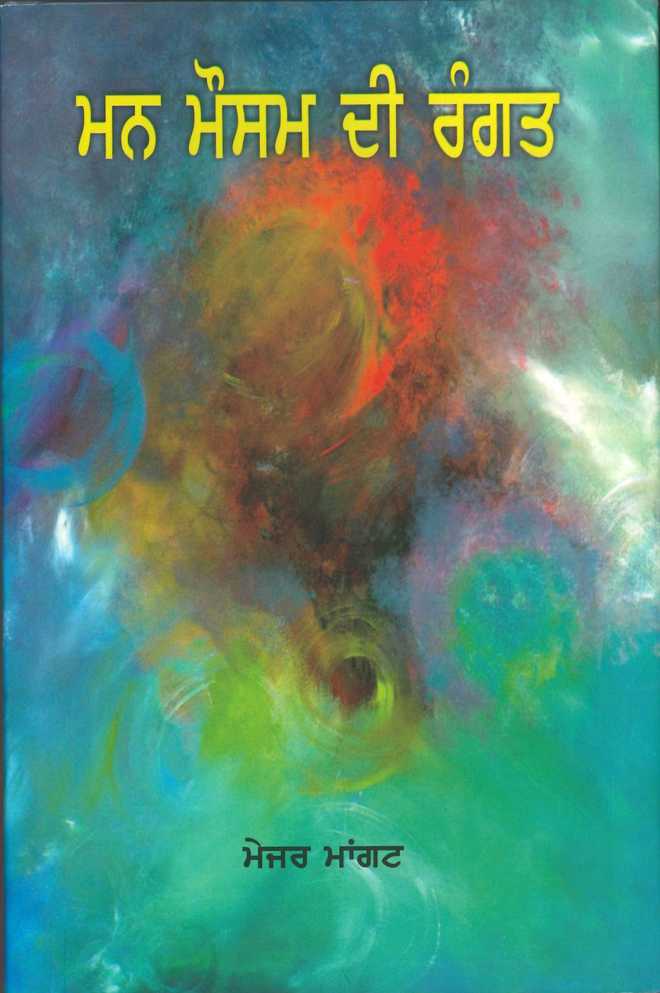
Man Mausam di Rangat by Major Mangat. Unistar Books. Pages 142. Rs 195
Jaspal Singh
Wherever and whenever people venture into new lands, they carry the baggage of their religion, language and culture along. New vistas spawn new creative impulses, resulting into new forms of literature. With the dispersal of Punjabi community in the Western world particularly in Britain, Canada and the USA, a huge crop of writers – poets, playwrights, fiction and prose writers has appeared on the horizon. Of late, Canada has become a very fertile land for them. Poets like Ravinder Ravi, Gurcharan Rampuri, Ajmer Rode, Navtej Bharti, Surinder Dhanjal, Gurdev Chauhan and many others have been living there for years now, as do fiction writers like Waryam Sandhu, Jarnail Singh, Major Mangat and Sukhinder as well as prose writers like Sukhwant Hundal, Sadhu Binning, Surjan Jeervi, Sadhu Singh and Raghbir Sirjana to name a few.
Major Mangat migrated to Canada from Samrala in 1990. He is a well-known short-story writer with six collections of stories to his credit, the latest being Man Mausam di Rangat (Colours of the Mental Landscape) carrying 10 sensitive stories about the existential problems of Punjabi immigrants in Canada. Quite a few other writers have taken up such themes to articulate their feelings and perceptions.
The first story Chakarvaat (The Cyclone) is not about a tropical storm, but about the tornado brewing in the mind of Harman Singh, a handicapped old man whose his children have abandoned him in an old age home. He had sacrificed everything for his family, bought them a comfortable house and gave good education to his children. But as soon as they learnt to open their wings, they flew to distant destinations dumping the old widower in the old-age home. Many other senior citizens from India, living in the home, also have similar stories to tell. But white inmates like Harnam’s late friend Leslie always advised him, “You have lived your life. Now it is the turn of your sons and daughters. Let them live as they wish and don’t tie stones of kinship to their wings. Enjoy whatever life is left in you.” But Indians are Indians after all they cannot shed their nagging habits and the baggage of bondage.
In the story Surkharu (Free of responsibility), a mother and daughter are fighting a bitter verbal battle. The adult girl, born and brought up Canada, behaves like other Canadian youngsters, though she is very sensitive to human concerns. The mother wants to keep her home and not go out with boys, especially late in the night. However, on the advice of her co-workers, the mother gradually comes to accept the situation and changes her outlook completely. Now she feels free from the constant tension.
A couple of stories like Sandd (Tool) and Kichar Kichar Kacch (The Brittal Glass) are about the tyranny of wives, whom many Punjabi boys married in order to migrate to Canada. These women behave like cruel despots treating them like dogs. The boys turn to heavy drinking that eventually kills them in middle age. In many such cases, the mothers-in-law usually play a dirty role, ill-advising their gullible daughters to keep their husbands on a tight leash.
The story Khirhki Ch Latkda Chand (The Moon Hanging from the Window) is about the atmosphere of fear and suspicion prevailing in the Western world after 9/11. Though Canada was a neutral country but apparently was not free from this atmosphere. Muslim bashing and implicit racialism can be perceived in certain situations. The change in the outlook of some white Canadians is perceptible at the international air ports.
A sensitive story, Garam Hawa Da Bulla (A Gust of Hot Wind), is about a Canadian-Punjabi girl Tanu who wants to do research on male-female discrimination in the Third World countries. Her field work pertains to India. So she flies to India to stay with her relatives in Punjab where she faces many funny and awkward situations. Every one treats her as a prospective bride for their son so that the boy can migrate to Canada making it possible for for the entire family to follow suit.
Hadda Rorhi (Dead Animal Yard) is an interesting story about the manipulations and politics of ‘awards’ in Punjabi. Unethical senior professors in the selection committees play dirty. Non-resident writers from abroad are taken for a ride by these unscrupulous literary hawks who swoop on them like vultures on a dead animal.
Man Mausam di Rangat (Colours of the Mental Landscape), the story that lends its name to the collection, is about the life of a middle aged woman Jinny, a Greek migrant to Canada, who lives alone with her loving dog that dies in an accident. Jinny and her friends are drowned in profound grief as she has lost all meaning in life after her pet’s death.
Major Mangat is an acute observer with an extremely sensitive soul. Therefore, these stories display diverse facets of human nature — love, compassion, indifference, brutality and blatant barbarism.



























